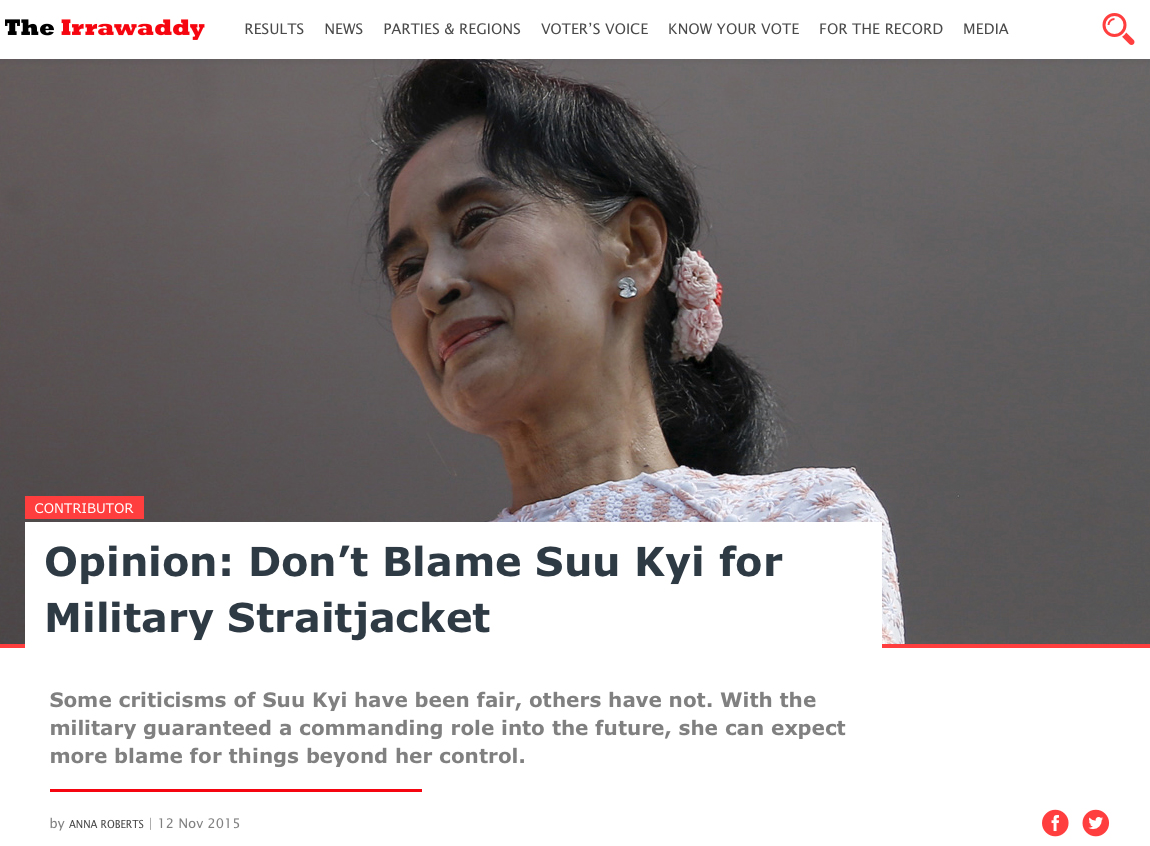Anna Roberts, Executive Director of Burma Campaign UK, writes in The Irrawady:
Over the election period, there has been an obvious focus on Aung San Suu Kyi and her future political role in Burma. Many articles and comments have been very critical of both her style of leadership and her statements, or lack of, on many of the most serious human rights issues facing the country. In particular, she has come in for sustained criticism over her failure to seriously address the persecution of the Rohingya and the decision not to have a single Muslim National League for Democracy candidate.
Some of the criticism is justified. It is deeply disappointing that Aung San Suu Kyi has been largely silent on the biggest human rights crises in Burma, notably the crimes committed against the Rohingya and the abuses committed by the Burmese Army in Kachin and Shan state.
The failure of Aung San Suu Kyi’s leadership to seriously challenge the rising tide of anti-Muslim prejudice and Buddhist nationalism has allowed Ma Ba Tha and others to relentlessly push their agenda of hatred, and has been a missed opportunity to confront bigotry and offer a principled, alternative vision for an ethnically and religiously diverse country.
On the other hand, is anyone seriously arguing that an NLD government won’t be a big improvement over one led by Thein Sein? Criticism of Aung San Suu Kyi should be kept in perspective and not deflect from the real causes of Burma’s problems.
Aung San Suu Kyi hasn’t committed any human rights violations. She is not supporting attacks against Muslims or spreading anti-Muslim hatred. She is not responsible for an army that has used rape and torture as weapons of war and deliberately targeted ethnic civilians. She is not locking up political prisoners for their peaceful activism. She has not presided over the systematic repression of the Rohingya or been implicated in ethnic cleansing, crimes against humanity and what Yale University’s Human Rights Clinic has deemed a potential genocide.
President Thein Sein, however, is ultimately responsible for all of the above. So it is surprising that we do not hear even a fraction of the criticism that is leveled at Aung San Suu Kyi directed at Thein Sein. In fact, quite the reverse. Despite years of broken promises of reform, and leading a regime responsible for some of the worst human rights abuses in the world, Thein Sein is given the benefit of the doubt. There may be some criticism of the military-backed government, but Thein Sein seems spared such scrutiny. He is still presented as a reformer trying to keep military hardliners in check, a statesman leading the country through turbulent times.
Yet there is no evidence to suggest this is the case. Thein Sein was at the heart of Burma’s military dictatorship for decades. He presided over the drafting of the 2008 Constitution, which secures military control at every level of government. Thein Sein’s legacy is clear.
It is of course essential to scrutinize political leaders and hold them to account, but in the case of Burma, there seems to be a narrative emerging that blames the victim not the oppressor. Aung San Suu Kyi is herself a victim of the policies of Burma’s military dictators. She won the election in 1990, but was denied power. She spent years under house arrest, often portrayed as being inflexible, hardline and almost responsible for her own detention. She has faced attempts on her life. And she is constitutionally barred from being President, despite the fact that it is clearly, overwhelmingly the will of the people.
Aung San Suu Kyi has yet to have the opportunity to transform the National League for Democracy’s human rights commitments into action. With the NLD’s anticipated landslide election victory, there will be high expectations for fundamental change after so many years of military rule. But under the current Constitution, it will have very limited scope to prevent some of the most serious human rights abuses from continuing.
The military will still be in control of key areas such as the police, security services and justice system. The army will be beyond the control of any civilian government and free to continue attacks against ethnic people, as was the case on the day after the vote, when the Air Force reportedly bombarded the headquarters of the Shan State Army-North in Kyethi. The military will continue to hold a veto over efforts to make the Constitution more democratic.
Yes, an NLD government will need to be held to account for the decisions and policies it makes, but that needs to be balanced with the fact that it will be a government that is severely restricted in what it can achieve.
Will Aung San Suu Kyi be blamed for the political straitjacket created by Thein Sein and the military?
As the new political landscape takes shape, it will be important to remember who is really responsible for the fact that Burma is not yet a genuine democracy that respects human rights.

